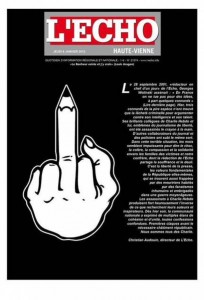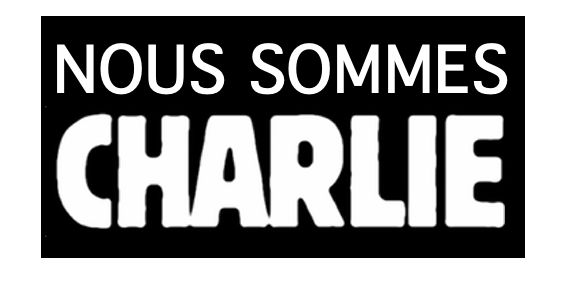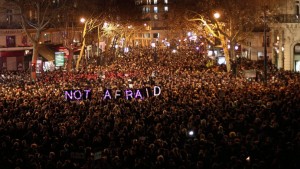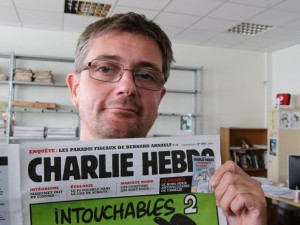Following the Charlie Hebdo Massacre, how long will the Solidarity Last?
When masked gunmen emerged on Wednesday from the magazine’s offices and onto the street proclaiming, “We killed Charlie Hebdo,” it was a reference not only to the 12 people they shot dead in cold blood, but to the satirical magazine itself.
An attack, in other words, on the very organs of free speech.
In response, the French — invariably riven like other nations along political, social and ethnic lines — have come out in a series of striking demonstrations of solidarity. (The photo attests to no mean measure of defiance too.)
Unity
Within hours of the mass shooting of artists and journalists, thousands congregated in public squares across France, Western Europe and North America, with placards, press cards and pens thrust into the air, displaying quiet, poetic power.
Signs read, “I am Charlie,” “Je suis Charlie,” “Yo soy Charlie,” in innumerable languages. More than 21 million viewers watched President François Hollande’s speech calling for national unity, a message with which his arch rival and former president Nicolas Sarkozy publicly agreed.
French leaders across the political spectrum warned against drawing an “amalgame,” French shorthand for the conflation or confusion of Islamist extremists with the moderate Muslim masses, numbering close to five million.
Radicals and Reactionaries
Even Marine Le Pen, leader of the far-right National Front, was uncharacteristically restrained, echoing calls to avoid assailing moderate Muslims for the heinous acts of a handful of radicals.
But her number two, Florian Philippot, dropped what some fear was a short-lived charade, and reverted to a familiar party line: “To say that radical Islam has no relation to immigration, is to live on another planet.”
Other far-right groups used Wednesday’s attacks to justify a clamp-down on immigration, and denounced the “Islamification” of France.
Clearly more than one kind of radical lies in wait. But the spontaneous waves of support and solidarity in France and beyond have so far proved a potent riposte to the small and craven hatred of masked men who fired upon defenceless artists, and indeed to the alarmists who wish to pull up the drawbridge.
Having tried to shut down Charlie Hebdo, the attackers instead transformed an internationally obscure magazine into a Cause Célèbre.
As though to prove the futility of the attack, cartoons have been drawn, articles penned and sent around the world with amazing speed, embodying the kind of defiance and intellectual freedom the gunmen had sought to uproot.
And it’s probably just the beginning.
As never before, we can share art, information and ideas – the arms against intolerance that made Charlie Hebdo a target and a national treasure.
“I prefer to die standing than live on my knees.”
For years, the magazine has made light of Jesus, the Pope, rabbis and saints. But its portrayal of the Prophet Mohamed got Charlie Hebdo into hot water. After receiving death threats, its offices were put under police protection.
Still, Charlie’s satirists continued to critique and confront the corrupt and the retrograde, zealots and fundamentalists who detest free speech and the creative thought that girds it. Charlie Hebdo lampooned fanatics, mischievously mocking dogmatic dictators — despite a previous arson attack.
Editor Stéphane Charbonnier had ignored police warnings urging him to tone it down, saying in 2012, “I prefer to die standing than live on my knees.”
It would turn out to be a tragic prophecy.
“Rally of Condemnation”
Though traumatized and afraid, surviving staff and contributors will publish one million copies of the next issue of Charlie Hebdo next week — many times its regular circulation — a gesture of defiance if ever there was one. (Proceeds will go to victims’ families.)
Muslim leaders have denounced the killers and their twisted creed. One imam called them “followers of Satan.” The country’s major Muslim organizations have pledged to hold “rallies of condemnation” after Friday prayers, not least to distinguish themselves — for the benefit of those who need convincing — from so-called Islamists who kill in the name of religion.
Some fear an anti-Muslim backlash. So we must remain watchful and wary of poisoned minds, bent not only on creating caliphates that monitor behavior and decide who is to live and die, but of their right-wing relatives whose world-view is scarcely more evolved.
We must watch, and when necessary, resist, with all of the creative and intellectual power we can muster.
*
This commentary first appeared in The Huffington Post





